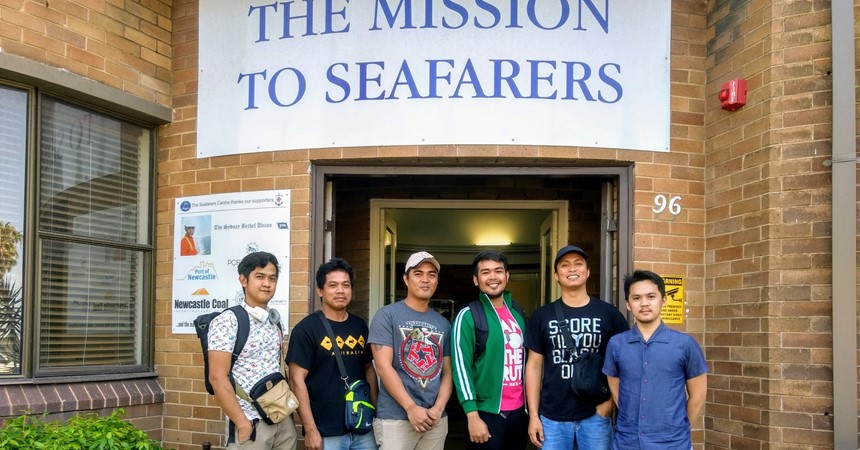We’ve all seen the queue of vessels off the Newcastle coast and their lights at night on the horizon. But we probably never imagine that all those seafarers are longing to come ashore. Time is a killer for seafarers. They are on nine or 12-month contracts and many never touch land in that time. Mental health is a huge issue. The International Transport Federation (IFT) estimates suicide is 20 times more prevalent in the seafaring community than in land-based industries.
The Port of Newcastle is the biggest exporter of coal in the world and 2500 vessels enter and depart the harbour every year, which amounts to 40,000 seafarers. It presents a huge opportunity to offer ministry. The Mission to Seafarers centre in harbourside Wickham is ably meeting the challenge with the Apostleship of the Sea offering care for all nationalities visiting Newcastle port.
“At least half of them coming to Newcastle avail themselves of the opportunity,” said Garry Dodd, Anglican Senior Chaplain at the seafarers’ centre. “But that’s a conservative estimate.”
The Hannell Street centre is an ecumenical service provided through the Anglican Church in concert with Stella Maris, with Port Chaplains offering practical, pastoral and spiritual support to seafarers. The mission also celebrates Mass at the centre every week.
Newcastle is one of the ports that allow seafarers to come ashore - and what a beautiful sight it must be. But not every seafarer gets to disembark. The short turnaround times for the vessels often make it impossible. If that’s the case, Mission to Seafarers teams visit them on board with books, magazines, CDs, knitted beanies, and souls full of hope.
“One thing about seafarers is they trust the Mission to Seafarers brand,” says Rev Dodd. “They see the flying angel or the Stella Maris anchor and cross, and they know we’re not government, we’re not union, we’re not agent. We represent God. They know they can trust us - and that gives us access to everybody on board, from the captain down.”
Last year, Mission to Seafarers teams visited 51% of available vessels, “but it’s a false number” said Rev Dodd. “How do you measure the value of that? You can go on board one vessel and have a five-hour conversation with the captain and hear his pain, heartache and despair, and offer encouragement as opposed to going on 10 ships in five hours with a cursory ‘Hi, how are you, here’s a gift’.”
Just before Easter this year, a captain died of a heart attack and the vessel spent two days off Swansea waiting for permission to dock. When it finally berthed, on Good Friday, Chaplain Richard Bergholcs and volunteer ship visitor Maureen Grealy were allowed on board. “We made sure the seafarers were OK,” said Chaplain Bergholcs. “The captain was well respected.”
For seafarers permitted to disembark in Newcastle, the mission’s minibus takes them wherever they want to go. Volunteers help them change money or find medical needs. Importantly, they are brought to the centre for meals, and the mission gives away at least 100 a week. Committed volunteers are passionate about what they do and create a great atmosphere at the centre.
“We provide a quality service to these young seafarers, men and women,” said Chaplain Bergholcs. “But the thing they really like to do is chill out at the centre and be in private contact with their families.”
Often that contact is bittersweet. Nearly every week there is a seafarer at the centre who has never seen their baby.
“We have really fast, free Wi-Fi,” said Rev Dodd. “They are able to Skype home and see their babies and there are tears everywhere but it’s really good. It is digital chaplaincy at its best.”
Conversely there is sadness when they find out about a death or sickness in the family. “And here we are ministering to them in their grief,” said Rev Dodd.
Australia is considered one of the best countries in the world for seafarers’ rights.
“The Australian Maritime Safety Authority (AMSA) does a brilliant job at caring, looking out for, and protecting seafarers,” says Rev Dodd. “We are not aligned with any other organisation, but we are happy to work hand in hand with AMSA and ITF. Seafarers from around the world trust the mission and we are often their eyes and ears. They’ll come to us. They might be fearful of losing their job. Sometimes they haven’t been fed, or they haven’t been paid for six months. That is common. We can inform AMSA. So we’re in a position where we can care and offer the sacraments, but we can also be doing the social justice stuff.”
Rev Dodd said the Catholic and Anglican churches work beautifully together in Newcastle. “It’s purely the generosity of the Maitland-Newcastle Diocese that funds the chaplain,” he said. “It’s the gift of the Bishop that makes it happen”.
The volunteers are the key. The people of Newcastle fund the mission – there’s no federal or international money. “The beautiful thing is,” said Rev Dodd, “they are employing a missionary but instead of us going out into the world and sharing God’s love, the world comes to us.”
A painting on the wall of the centre’s chapel shows resurrected Christ offering a blessing with his hand and has “God Is Love” displayed in 36 languages. “It’s emblematic of the mission and Stella Maris,” said Rev Dodd.
“It’s a beautiful ministry,” he said. “It is the church sowing into people’s lives with no expectation of any returns. We may never see these seafarers ever again. We give them hope and strength to face a tough voyage.”
The annual Day of the Seafarer (DotS) will be celebrated on 25 June. Sea Sunday is celebrated on 21 July and includes an ecumenical event at the Anglican Cathedral.
The mission needs volunteers. Please call 4961 5007, or email christine@mtsnewcastle.org



























































































